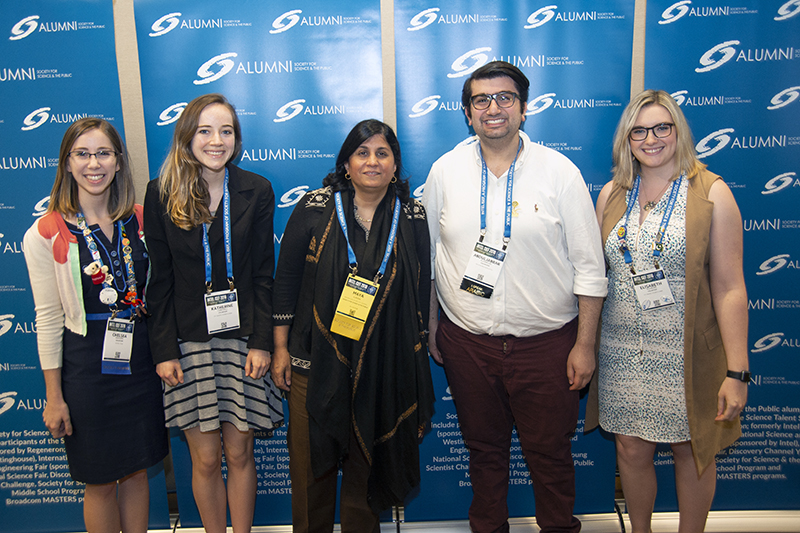Science fairs launch students on a pathway of success

As the world’s largest pre-college science competition, the Intel International Science & Engineering Fair (Intel ISEF), a program of the Society for Science & the Public, gives students from countries around the world the opportunity to showcase their impressive research and meet fellow young scientists and engineers. Competing for an average of $4 million in prizes, Intel ISEF is a life-changing event for participants.
But that’s just the beginning. At the symposia, “Leveraging Your Science Fair Experience: Oh the Places You Can Go,” at this year’s Intel ISEF in Pittsburgh, PA, Maya Ajmera, President & CEO of Society for Science & the Public and Publisher of Science News, spoke with four remarkable Intel ISEF alumni about their experiences and where life has taken them since they participated. As a STEM enthusiast and alumnus of the 1985 Science Talent Search, Maya can certainly attest to the positive power of science competitions. These panelists enjoyed Intel ISEF so much, they are back this year as volunteers!
The panelists included Abduljabbar Alhamood, biomedical engineering student at Boston University (Intel ISEF 2014-2015); Elisabeth Ashmore, student in the department of Communication Science and Disorders at the University of Pittsburgh (Intel ISEF 2012-2013); Katherine Cordwell, Ph.D. candidate in computer science at Carnegie Mellon University (Intel ISEF 2011-2013, STS 2013); and Chelsea Massaro, Ph.D. candidate in chemical biology and medicinal chemistry at the University of Texas, Austin (Intel ISEF 2009-2012).
The alumni shared stories from their experiences and gave advice to current finalists on how to make the most of their time at Intel ISEF.
Why they decided to give back at this year’s Intel ISEF:
Because Intel ISEF meant so much to these students, they wanted to give back and help facilitate the event that made a huge difference in their lives.
“Intel ISEF was super important and it meant a lot to me to come here in high school. I think it’s important to think about the things that helped you get to where you are,” Katherine said.
Chelsea credits Intel ISEF for why she is in research now, and wanted to help inspire this year’s competitors.
“I think if I had not participated in science fair, I would not have gone down the research path. It was really important for me to come here and give back and see what it takes to put on Intel ISEF. I miss it after being gone for four years,” she said.
Elisabeth remarked on her history with science fairs. “I was involved in science fairs from the fourth grade to the twelfth grade. It was just something that was normal in my life,” she said. Now, as a volunteer, she is ensuring the same critical mentorship she received as a child.
As a participant in Intel ISEF, Abduljabbar was especially grateful to all the volunteers that made sure he received reassurance and support during the long days of judging. Their kindness inspired him to become a volunteer once he was in college.
“I want to be the person who puts a smile on somebody’s face when they are very stressed,” Abduljabbar said.
On how they have dealt with disappointments and challenges:
Being a scientist means dealing with both success and failure. The alumni offered tips on how they deal with inevitable disappointments in their research.
“To put it in perspective, always remember if it feels like something is going wrong, it’s going to be okay in the end. Sometimes in order to get to success you have to have a failure first,” Katherine shared.
“I’ve been told that having a career in science is more a test of your persistence than it is of your intelligence,” Chelsea added.
Failure can be an asset, and allows scientists time to think about what they can do differently in the future.
“I honestly feel that I learn more from my failures than my successes,” Abduljabbar said. He explained that failure forces you to assess what went wrong and how you can improve your research.
“Research doesn’t happen alone. You’re always on a team, so you just have to keep pushing each other to make it through,” Elisabeth said.
Their advice to this year’s finalists:
Although participating in Intel ISEF can be stressful, the panelists encouraged students to enjoy their time in Pittsburgh.
“Take lots of pictures, go to all of the events, take advantage of everything while you’re here,” Elisabeth said.
“Make lots of friends, because chances are you’re going to see a lot of these people wherever you go to college,” Abduljabbar added.
What’s next for them, and how do they plan to get there?:
Katherine said she is trying to keep her path open. She might become a professor, or perhaps conduct research in industry.
Abduljabbar sees himself as a research scientist and professor.
“I really want to inspire people to pursue science and research, because I believe that’s the next step for humanity to solve a lot of challenges,” he reflected.
Chelsea said she goes back and forth between what she wants to do. She’s trying to decide between a career in academia or industry. Elisabeth says she sees herself becoming an educator or a healthcare consultant for various organizations. Although they have all taken different paths in life, one thing is clear–the experiences of these ISEF alumni have helped them to bloom in their careers!


